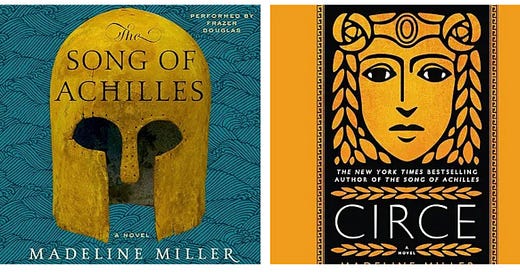Book Life Dual Review by Carol O’Day: Song of Achilles and Circe (Madeline Miller, author)
Historical fiction, Greek mythology reimagined. Achilles, Patroclus, Thetis, Trojan War; Circe, Odysseus, Zeus, Helios, Athena, Telemachus, Daedalus and Icarus, Jason and Medea, witchcraft.
Author Madeline Miller’s two Greek-mythology inspired novels, The Song of Achilles (2012) and Circe (2018) give new meaning to the term “historical” fiction; they dig way back in history to ancient Greece, and re-imagine the lives of some of the gods and heroes of age-old lore. The Song of Achilles preceded Circe. Miller’s second of these, Circe, is the more compelling and complex read.
The Song of Achilles is, as its title suggests, the story of Achilles, one of the mythical warrior heroes of the Trojan War. Miller portrays Achilles as the golden child of King Peleus of the small Greek island kingdom of Phthia. The novel’s narrator, Patroclus, the largely disregarded son of another king, first sees Achilles at a sporting event hosted in Patroclus’ father’s kingdom. Achilles wins the footrace and Patroclus is enthralled. Events conspire to throw the two young men together years later. After an accident in which Patroclus pushes a bully to the ground and the bully dies, Patroclus’s father exiles him to Phthia to be fostered by King Peleus. There young Patroclus and Achilles become close friends, and eventually lovers. When King Peleus sends Achilles to the mountains to be tutored by Chiron, a centaur, Patroclus escapes the kingdom to join him. When Achilles is recalled to Phthia, his father once again sends him away to avoid sending him to war. Patroclus follows and discovers Achilles disguised as a woman in another kingdom. Achilles cannot forever avoid his fate, however, as it decreed by the gods, and is sent to the Trojan War, with Patroclus in tow as his mate. Over a decade of raids and battles ensue before Patroclus and Achilles both meet their deaths.
Circe is the story of the goddess and temptress who famously lured and beguiled Odysseus on the rocks on his great odyssey. The daughter of Titan Helios and nymph Perse, Circe possesses the power to transform rivals into monsters and to grant humans immortality and render gods into humans. When Circe oversteps her role, circumventing Zeus’ punishment of Prometheus for giving fire to humans, Zeus banishes Circe to a remote island. On the island Circe perfects her witchcraft powers using nature’s abundant plant and animal life. She falls in love with a mortal on the island and awards him immortality. However, when her human betrays and chooses another, Circe takes revenge and transforms her rival into a monster. Miller concocts many dramatic visits to Circe’s island by familiar gods and heroes—Athena and Hermes, Jason and Medea, Daedalus and Icarus, and Odysseus. Circe captivates Odysseus and he remains on her island for a year. After he departs, Circe gives birth to his son, Telegonus. Once grown, Telegonus goes in search of Odysseus and in a twist of fate, Telegonus unwittingly kills Odysseus. He returns to Circe’s island with Odysseus’ wife, Penelope, and his son, Telemachus in tow. Later, when Telegonus departs on his own journey, Circe finds love with Telemachus and vows to transform herself into a human to and live as a mortal with Telemachus.
Circe’s characters are ripped from Greek mythology and known to most readers. The novel rolls forward with many twists and turns resulting from Circe’s exercise of her powers. She wields them sometimes impulsively, sometimes out of misguided emotions and sometimes in error, creating waves of suspense. Her powers, her isolation and the visits and antics of other gods and heroes, and the almost limitless actions available to them are riveting. By contrast, The Song of Achilles, is somewhat flat and repetitive. Its primary, and purportedly shocking, conceit is the (somewhat) forbidden love story between Patroclus and Achilles, a relationship which is noticed but largely ignored by kings and soldiers because of Achilles’ hero status. Patroclus waits almost the entire novel to come into his own, apart from Achilles. Yet, when he finally emerges, he acts it is disguised as Achilles. Patroclus’ devotion to Achilles grows tiresome. The love story is one of imbalance. Over the course of the novel, Achilles’ glow tarnishes; he grows arrogant and prideful, and unlikeable. This turn chafes against the centuries old image of Achilles as a heroic warrior.
While The Song of Achilles is a fresh take on historical fiction, and brings to life some of the ancient Greek gods of the myths we all learn in school, it expends a lot of pages naming kingdoms and kings, their conquests and battles and their progeny, and fails to establish sufficient character arcs and dramatic tension. By contrast, Circe weaves a full life story around its central figure; her flaws and actions create suspense that keeps the reader engaged to the end. That we never quite know whom she will next encounter or torment or where she will travel is the magic of this novel.
Support local bookstores and BookLife: Reviews for Readers by purchasing Circe and Song of Achilles using the links below:





